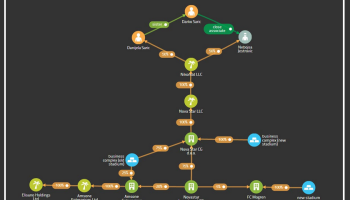“The Montenegrin spring has arrived,” said Vanja Calovic, the head of MANS. MANS is an OCCRP partner.
Calovic called on Prime Minister Igor Luksic to decide whether he will support his people, or be a “puppet in the hands of organized crime.”
“Their [government's] mouths are full of Europe, and their pockets filled with our money,” she said. But she said that recent events show that the small southern Balkan country is not European.
“In Europe, when you steal, you go to a prison. You don't become an ambassador. Europe is not Saric, nor Kalic,” she said, referring to the fugitive Montenegrin drug lord Darko Saric and his associate Safet Kalic.
“We want decisions to be made in the Parliament, not in Café Grand and casinos.” she continued. She was referring to the Cafe Grand in Podgorica, where former President and former Prime Minister Milo Djukanovic often holds court with businessmen close to the government.
She also called on the government to arrest Djukanovic, and urged Luksic to step up his fight against organized crime or “join the criminals on the way to jail.”
Prime Minister Luksic told the press earlier that he sees no significant differences between the demands put forth by the protesters and what the Montenegrin government is already doing. He expressed his understanding for people's frustration, noting that it would be unreasonable to believe that there are no dissatisfied citizens, especially when it comes to socio-economic matters. He further stated that there is no country in Europe that is free of socio-economic problems and related protests.
Srdjan Kekovic, the head of the association of Free Trade Unions, called for a thorough investigation into the privatization process of former state-owned companies.
“Where are the €7 million spent on bribing government officials during the privatization of Telekom? Where are millions of Euros that Russians claim they invested in the Podgorica Aluminum Plant?” he asked.
He also wanted to know why the country’s power company was sold for €100 million less than one of the top bids.
Organizers also called for the heads of the regulatory agency to resign and asked for lower electricity bills. High electricity prices were the catalyst for a similar anti-corruption protest in January.
In addition to their complaint against corruption, the protesters also demanded greater freedom of press, free education, and a unified application of the Bologna Process, a European agreement aimed at standardizing education across European countries.





